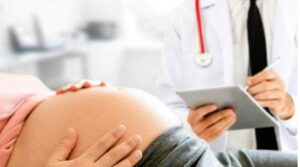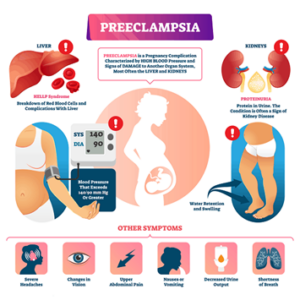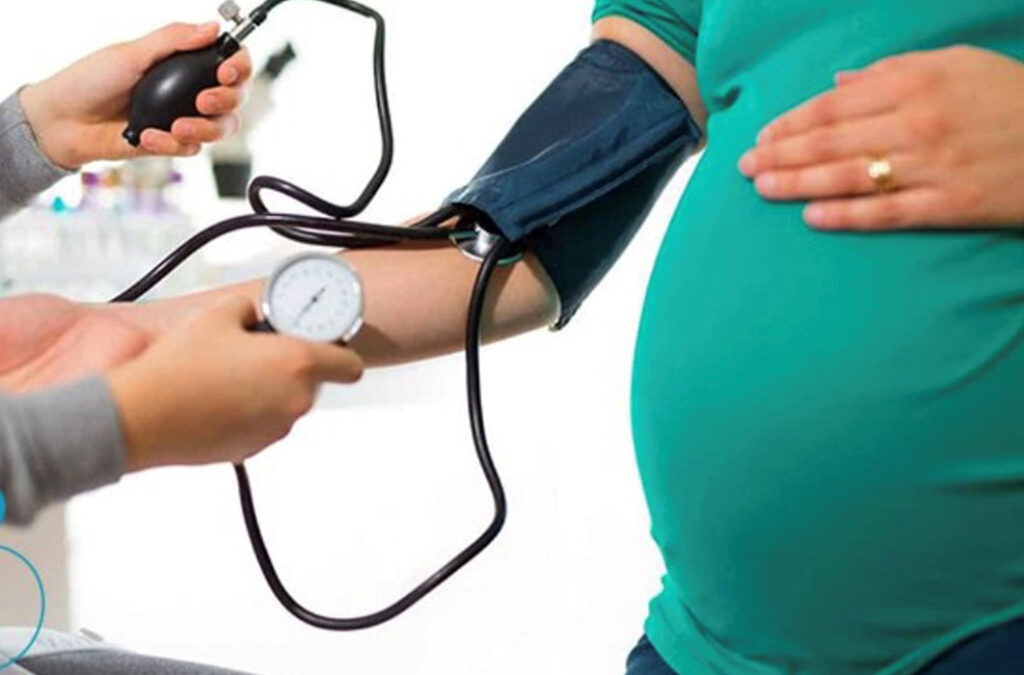Dec 7, 2022 by EMPWellness Admin
High blood pressure during pregnancy
High blood pressure (HBP or hypertension) is when your blood pressure, the force of your blood pushing against the walls of your blood vessels, is consistently too high.
To survive and function properly, your tissues and organs need the oxygenated blood that your circulatory system carries throughout the body. When the heart beats, it creates pressure that pushes blood through a network of tube-shaped blood vessels, which include arteries, veins and capillaries. This pressure — blood pressure — is the result of two forces: The first force (systolic pressure) occurs as blood pumps out of the heart and into the arteries that are part of the circulatory system. The second force (diastolic pressure) is created as the heart rests between heart beats.
Having high blood pressure during pregnancy is one of the problems that worries many doctors and mothers during this period. High blood pressure during pregnancy can bring risks and problems for both the mother and the fetus. But it must be said that this problem is not limited to pregnancy. High blood pressure can cause problems during and even after childbirth. But the good news is that high blood pressure during pregnancy can be prevented and treated. So stay with this article in EMPwellness until the end. High blood pressure is common among pregnant women in many countries and can occur in one out of every 12 to 17 pregnancies among women aged 22 to 43. In general, high blood pressure has become more common during pregnancy. However, you and your child can be protected from the dangers of this disease by properly and timely blood pressure control and keeping it at a normal level.
The most important thing is that if you have a history of high blood pressure, be sure to consult a specialist doctor before pregnancy so that he can give you the right solutions to maintain and control your blood pressure during pregnancy. Because it is very important to treat high blood pressure before, during and after pregnancy.
The types of high blood pressure during pregnancy:
• Chronic hypertension. In chronic hypertension, high blood pressure develops either before pregnancy or during the first 20 weeks of pregnancy. Because high blood pressure usually doesn’t have symptoms, it might be hard to know exactly when it began.
• Chronic hypertension with superimposed preeclampsia. This condition occurs when chronic hypertension leads to worsening high blood pressure during pregnancy. People with this condition may develop protein in the urine or other complications.
• Gestational hypertension. People with gestational hypertension have high blood pressure that develops after 20 weeks of pregnancy. There’s no excess protein in the urine and there are no other signs of organ damage. But in some cases, gestational hypertension can eventually lead to preeclampsia.
• Preeclampsia. Preeclampsia occurs when hypertension develops after 20 weeks of pregnancy. Preeclampsia is associated with signs of damage to other organ systems, including the kidneys, liver, blood or brain.
What are the complications of high blood pressure during pregnancy?
Unfortunately, high blood pressure during pregnancy can cause many complications for both the mother and the baby, which include the following: For the mother, it can lead to preeclampsia. Preeclampsia is high blood pressure and resulting liver or kidney damage that occurs in women after the 20th week of pregnancy. Although it is rare, preeclampsia may also occur after delivery (usually 48 hours), which is called postpartum preeclampsia. Another case is eclampsia. Eclampsia is the new onset of seizures or coma in a pregnant woman with preeclampsia. These seizures are not related to existing brain diseases. The occurrence of stroke is another risk caused by high blood pressure during pregnancy, which will bring its own problems if it occurs. For this reason, in such cases when the mother faces any of the mentioned problems, there will be a need to induce labor (giving medicine to start labor pain) and to separate the placenta from the uterine wall. One of the risks of mother’s high blood pressure for the child is premature delivery. A birth that occurs before 37 weeks of pregnancy and the baby’s weight is lower than normal. The mother’s high blood pressure is a problem for the baby because it cannot provide enough oxygen and nutrients for the baby’s growth. For this reason, the mother may have to give birth to the child early.
If you have high blood pressure before, during or after pregnancy:
– Plan for it before pregnancy and be sure to discuss the following with your gynecologist. For example, let your doctor know if you are taking any special medications. If necessary, they can prescribe you medicines that are safe to use during pregnancy. Many mothers mistakenly think that during pregnancy or before it means absolute rest and eating any kind of food they crave. But it must be said that one of the ways to control high blood pressure during pregnancy is to maintain a healthy weight through proper nutrition and regular physical activity.
-During pregnancy, be sure to visit a gynecologist regularly and perform the necessary examinations and tests at regular intervals. Talk to your doctor about any medicine you are taking and make sure it is safe. Do not start taking any kind of medicine, even over-the-counter medicines, arbitrarily and without the advice and prescription of a doctor. Check your blood pressure regularly at home with home blood pressure devices. Call your doctor if your blood pressure is higher than normal or if you have symptoms of preeclampsia. You can also consult your doctor regarding the preparation of a home blood pressure device. Additionally, continue to choose healthy foods and maintain a healthy weight to reduce your risk of high blood pressure during pregnancy.
-Pay attention to how you feel after giving birth. If you have high blood pressure during pregnancy, your risk of stroke and other problems after delivery is higher. If you have symptoms of postpartum preeclampsia, call your doctor or emergency room right away Call. Because you may need urgent medical attention.

Symptoms of preeclampsia
Symptoms of preeclampsia include the following: A headache that will not go away Changes in vision, including blurred vision, seeing spots or changes in vision Pain in the upper part of the stomach Nausea or vomiting Swelling of the face or hands Sudden weight gain breathing
problem Some women do not have any symptoms of preeclampsia, which is why it is so important to be under the care of a specialist doctor regularly during pregnancy and afterwards.
Who is most at risk of developing preeclampsia during pregnancy?
Symptoms of preeclampsia include the following: A headache that will not go away Changes in vision, including blurred vision, seeing spots or changes in vision Pain in the upper part of the stomach Nausea or vomiting Swelling of the face or hands Sudden weight gain breathing problem Some women do not have any symptoms of preeclampsia, which is why it is so important to be under the care of a specialist doctor regularly during pregnancy and afterwards. Who is most at risk of developing preeclampsia during pregnancy? You are more at risk of developing preeclampsia during pregnancy if: It is the first pregnancy. Have preeclampsia in a previous pregnancy. Have chronic (long-term) high blood pressure, chronic kidney disease, or both. Have a history of thrombophilia (a disease that increases the risk of blood clots). You are pregnant with multiples. You got pregnant using in vitro fertilization. You have a family history of preeclampsia. You have type 1 or 2 diabetes. You are overweight. You have lupus (an autoimmune disease). Or you are over 40 years old. In rare cases, preeclampsia can happen after you give birth. This is a serious condition known as postpartum preeclampsia. And it may also occur in women without a history of illness during pregnancy. Postpartum preeclampsia symptoms are similar to preeclampsia symptoms during pregnancy. Postpartum preeclampsia is usually diagnosed within 48 hours of delivery, but can occur up to 6 weeks later. If you notice symptoms of preeclampsia after delivery, tell your doctor or call the emergency room right away. Therefore, high blood pressure during pregnancy can be very dangerous for both the mother and the baby. For this reason, be sure to communicate with a specialist doctor before, during and after pregnancy and do the necessary tests and work to prevent or control this problem.

To reduce the risk of complications:
• Keep your prenatal appointments. Visit your health care provider on a regular basis throughout your pregnancy.
• Take your blood pressure medication and low-dose daily aspirin as prescribed. Your health care provider will prescribe the safest medication at the most appropriate dose.
• Stay active. Follow your health care provider’s recommendations for physical activity.
• Eat a healthy diet. Ask to speak with a dietitian if you need help planning meals.
• Know what’s off-limits. Avoid smoking, alcohol and illegal drugs. Talk to your health care provider before taking nonprescription medications.
Will I be able to breastfeed my baby?
Breastfeeding is encouraged for most who have high blood pressure, even those who take medication. Discuss your medications with your health care provider before your baby is born.

Good post. I learn something new and challenging on blogs I stumbleupon everyday. It will always be interesting to read articles from other authors and use a little something from their sites.